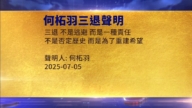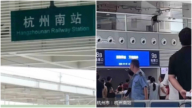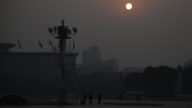【新唐人2011年2月11日讯】最近几年来,中国涉及法律诉讼的信访数量急剧增加。中国最高法院为了减少涉诉信访问题的产生,将在近期推出五项新的措施。不过,有律师认为这只是一种表面的姿态,司法不独立,问题还是无法获得解决。
中国大陆最高法院即将在近期推出的新五项措施,包括建立“涉诉信访”风险评估机制等。北京律师金光鸿表示,民众“信访”问题激增,根子出在中央!他认为,中共从上层到下层同样腐败,在中共专制体制下,“信访制度”解决不了百姓的问题。
金光鸿律师:“对信访制度的看法,我是认为它是专制制度的一个产物,专制制度不改变的话,‘信访’它是没有什么实际意义的。因为上层会关注哪些案件,往往都是由权力斗争来决定的。 ”
近年,中国访民数量增多,矛盾集中凸显了拆迁和征地的社会问题严重,曾经为奥运强拆的上访访民辩护的倪玉兰,同样也遭到强拆和当局的打压。她向《德国之声》表示,每次开全国两会前后,相关部门都会有一些措施出来,但这只是一种表面的姿态,她说,现在会有这么多的冤假错案,其实都是司法界的人员不作为造成的。
福建福州访民吴华英上访十年,十年过程,她看到访民问题得到解决的比例很少,倒是碰到上访二十几年的访友很多。
吴华英(福建福州访民):“我们也希望…他们(政府)不要制造这些不公正的冤案出来,只有在不制造的前提底下,才不会出现上访,没有冤的人谁会去上访。 2004年也提出来了,还有去年也提出来了—-清理久压不决的案件,8年以上,我弟弟都十年了,到现在案件还是搁在那个地方。”
北京律师刘晓原分析,上访的很多都是因为土地征用和房屋拆迁,民众利益被侵占,向法院提起诉讼。拆迁是政府统一安排的,法院在这样的诉讼中很难做到公正的裁决,民众不服就会上访。他指出,信访案件剧增与中国社会矛盾激化,“执法不力”以及“有法不依”有密切关系。这是目前民众最不满也是争议最大的问题。
北京维权律师唐吉田也指出,目前在中国大陆,很多法律问题很难在法律框架内解决,如果不能把公职人员变成代理人,把民众作为权力的第一来源的地位,实际上所有技术层面的东西只能够缓解一些问题,要从根本上解决,也就不用做太多的期待。
不过,吴华英表示,民意正在苏醒。
吴华英(福建福州访民):“大家受过伤的人,特别因为受过这些不公司法对待的人,他在上访的过程当中变得清醒起来,他会更加坚定捍卫自己个人的权利。”
十年来,吴华英坚持上访的原因是,希望藉由上访途径发出自己仅有的微弱声音,给地方政府了解,他们还在坚持着自己的冤情应该得到合理的解决,不能让这个声音停掉。
新唐人记者 李庭 王明宇 综合报导
——-
Chinese Supreme Court to Issue New Regulations to Restrict Lawsuit-Related Petitions
In recent years, the number of lawsuit-related appeals
increased dramatically in China.
The Chinese Supreme Court plan to issue 5 new
regulations to restrict this kind of petitions.
Law professionals believe such regulations would not
be effective without independent jurisdiction.
The Chinese Supreme Court plans to issue 5 new
regulations including establishing a “litigation appeal”
risk evaluation mechanism.
The root cause of increasing petitions lies in the CCP
central government, Lawyer Jin Hongguang said.
The CCP is corrupted thoroughly, and no appeal policy
can solve the problem under the CCP regime.
Jin: “I believe the appeal policy is a byproduct of
dictatorship, and it is meaningless unless the political
system changes, because now the power struggle
decides which cases are considered.”
The increasing number of appeals in China reflects
severe social problems such as forced demolition.
Ni Yulan, who defended appealers in the Olympics
demolition case, suffered from forced demolition and
oppression herself. New regulations are issued as
a superficial gesture before every national congress
meeting, Ni said to Deutsch Welle;
Injustice is prevailing because of judicial nonfeasance.
Wu Huaying from Fuzhou, Fujian has been appealing
for the past 10 years. During this time, she has seldom
seen successful appeals, but has made many friends
who have been pursuing appeals for over 20 years.
Wu Huaying: “We hope they (the government) stop
creating unjust cases, only then will appeals stop.
Why would we appeal if we were treated fairly?
In 2004 and last year, there was policy to clear
long unsolved cases, say, 8 years, but my brother’s
case has been 10 years, and it is still unprocessed.”
Lawyer Liu Xiaoyuan says that many appeals are
regarding lawsuits on forced demolition.
Such demolitions are planned by the government,
and it is difficult to achieve justice through litigation;
people therefore resort to petitions.
Liu believes the increased appeals are tied to China’s
severe social conflicts and the failure of the judicial
Beijing human right lawyer Tang Jitian says,
many judicial problems cannot be solved within the
current system.
No technical measure will be effective unless
the people become the source of power, and public
officers serve the role of agents.
But according to Wu Huaying, the Chinese people
are becoming more and more aware.
Wu Huaying (petitioner from Fuzhou, FuJian):
“People who were hurt, especially those by the judicial
system, are becoming more aware and persistent
during the appeal process. “
Wu has been petitioning for 10 years in hope of
having her voice heard by the local government.
Like her, many appealers believe that injustice
should be corrected, and their voice should be heard.
NTD reporter Li Ting and …




























